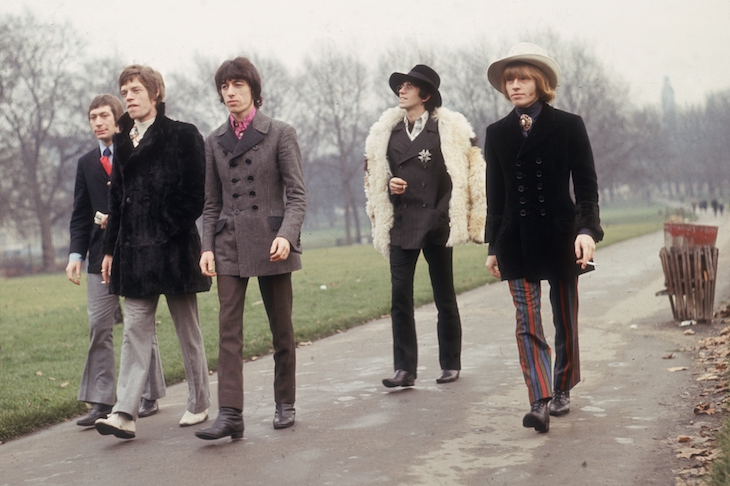Many moons ago, I worked at the New Musical Express magazine, which transformed me from virgin schoolgirl to the fabulous creature I’ve been for the past four decades. It’s hard to describe how influential the NME was at its 1970s peak. I’ve met people who waited in exquisite teenage agonies for two-week-old copies to arrive in the Antipodes, while my colleagues were regularly flown to the USA and supplied with groupies and cocaine as if they themselves were rock stars.
And then punk came along and rocked the gravy boat — and the internet finished the job. Last time I saw a copy, it was lying wanly in a bin marked FREE — PLEASE TAKE ONE.
What happened to Rolling Stone magazine is, in the American way, a far more epic tale than the descent of my alma mater—though it certainly isn’t given away, and indeed has seen a rise in circulation in recent times. But it has fallen further from the giddy heights it enjoyed when the editor, Jann Wenner, was a confidant of Bob Dylan, the Beatles and — yes! — the Rolling Stones. It was started as a music comic for addled hippies, with a modest loan from Jann’s parents and in-laws in 1967. (The rags-to-riches thing really does lose oodles of glamour when you find out that it was the Bank of Mom and Pop that got an empire-builder started — even more so an outlaw bankrolled by in-laws.)
But Rolling Stone soon became a serious political magazine for consipracy theorists, as personified by its chief ‘reporter’, Hunter S.Thompson. Now it’s up for sale, and I’d hazard a guess that this is in part because it has served its purpose, and the people Wenner used to cuddle up with are dead, doolally or doddering their way to a quiet grave.
At the NME we had a writer who worshipped Keith Richards and thus never washed and always wore the jacket on which the guitarist had done him the honour of vomiting copiously. My young eyes were opened to the extent to which many male colleagues had entered their profession not wanting to be writers but groupies. And it was Rolling Stone which made the pursuit of bromance more important than the art of criticism; you could easily have cut Penny Lane from the film Almost Famous and just had the RS cub reporter ‘servicing’ the bands instead. ‘Girls aren’t the only ones who adore Mick Jagger,’ pants a young Wenner; ‘when he gets married, there will probably be more disappointed males than females.’
The Rolling Stones themselves were not flattered, initially, by the magazine’s title — ‘Could have called it Beatles!’ Mick Jagger griped, before getting his manager to write a cease-and-desist letter. Still, it was nothing that a healthy dose of sucking up on Wenner’s part — comparing Jagger to Oscar Wilde — couldn’t cure, until they fell out over the 1969 Altamont festival. ‘Is Mick responsible for the killing?’ ran a typically nuanced photo caption.
Wenner’s desire to be best buds with every dribbling troubador ever to bag a platinum disc — ‘at five foot six he often found himself gazing up at his heroes like a boy vampire’ — cannot fail to wring a snigger from the softest heart. He was actually reported as saying he started Rolling Stone in order to meet John Lennon. But a weekend in which Wenner tried to impress him and Yoko ends comically (we get the miserable measure of both men as Joe Hagan writes: ‘Wenner watched with awe and a certain satisfaction as Lennon savaged fans who approached him’). Yoko wonders how the unimpressive Wenner managed to bag his exceptionally attractive wife, Jane — who was useful in securing the services of the photographer Annie Leibowitz.
No doormat, Mrs Wenner in turn got her kicks by calling her husband ‘Chubby Checker’, putting him on a diet containing sheep’s urine and drawing party guests’ attention to his psoriasis.
The real story here is not about a magazine or music but about homosexuality’s changing level of hipness. Wenner’s own mother ‘came out’ in the 1960s, but he himself had no such nerve. At the age of 12, Jann was arrested in a library for molesting the son of a local sheriff but he didn’t actually follow his heart until Christmas Eve 1994, when he announced to his wife that he was running off with a younger man.
His gayness was at constant odds with his desire to succeed at a time when homosexuality was seen as not quite the thing. In 1976, even Elton John was still referring to himself as bisexual in an interview with Rolling Stone, and it wasn’t till 1988 that he told them he was gay. Wenner, the old romantic, slept with more women than men because, though ‘it may not have been what I preferred, that’s what was available’.
By the 1970s, Wenner’s pearl-clutching in the face of the social unrest sweeping America saw him denounced as a dilettante by the latest lot of rebels, and he threw himself into the role with some enthusiasm, amping up the shmoozing to Herculean heights and indulging his taste for many-hued male members in the clubs of Manhattan. Regrettably, this sexual flexibility did not extend to his professional judgment: though Wenner privately ‘championed’ the flamboyant singer Sylvester, he still baulked at putting black musicians on the cover of Rolling Stone. Moving the office from laid-back California to hyperactive New York didn’t help; the writer Christian Kerr told me: ‘Even when I was writing for it, I wouldn’t have been seen dead reading it — it was a dad-on-the-dancefloor magazine.’
I must confess that I became so hooked on the scurrilousness of Sticky Fingers that I remained glued to it for a whole week. Coming in at over 500 pages, with testaments to Wenner’s ocean-going awfulness cropping up on every other page, you could have knocked me down with a plectrum when I read in the afterword that this book — though ‘independent, not authorised’ — was actually commissioned by Wenner. He gave Hagan ‘endless hours of interview time’ and access to 500 boxes of correspondence, documents and recorded conversations.
Why would a lifelong rotter suddenly come clean? It could be an egomaniac’s version of that thing alcoholics have to do when they apologise to everyone they’ve wronged. But given Wenner’s track record, it’s just as likely that he feels there is only one thing in life worse than being written about, and that is not being written about — as that famous wit Mick Jagger almost wrote.
Got something to add? Join the discussion and comment below.
Get 10 issues for just $10
Subscribe to The Spectator Australia today for the next 10 magazine issues, plus full online access, for just $10.
You might disagree with half of it, but you’ll enjoy reading all of it. Try your first month for free, then just $2 a week for the remainder of your first year.















Comments
Don't miss out
Join the conversation with other Spectator Australia readers. Subscribe to leave a comment.
SUBSCRIBEAlready a subscriber? Log in